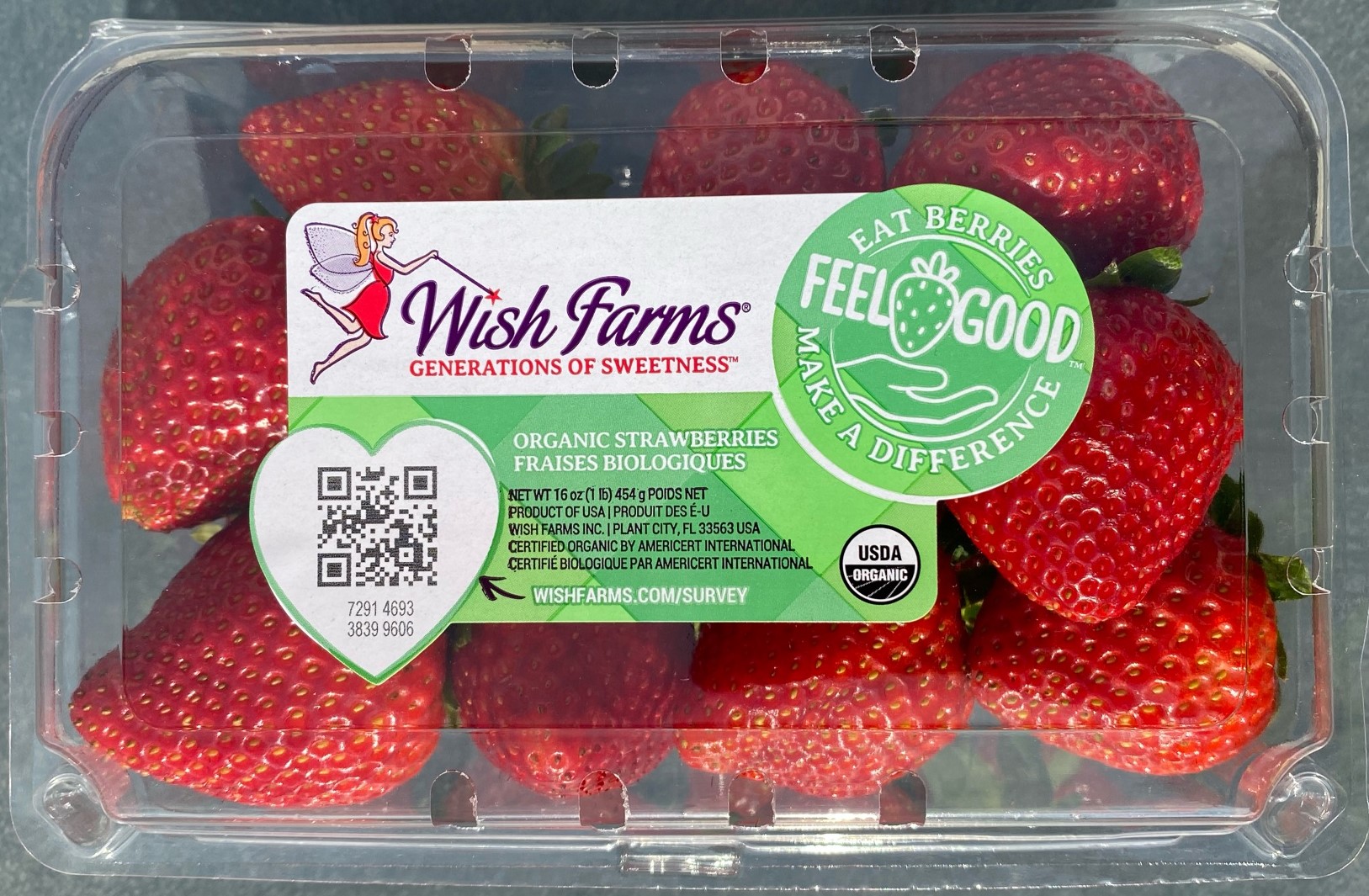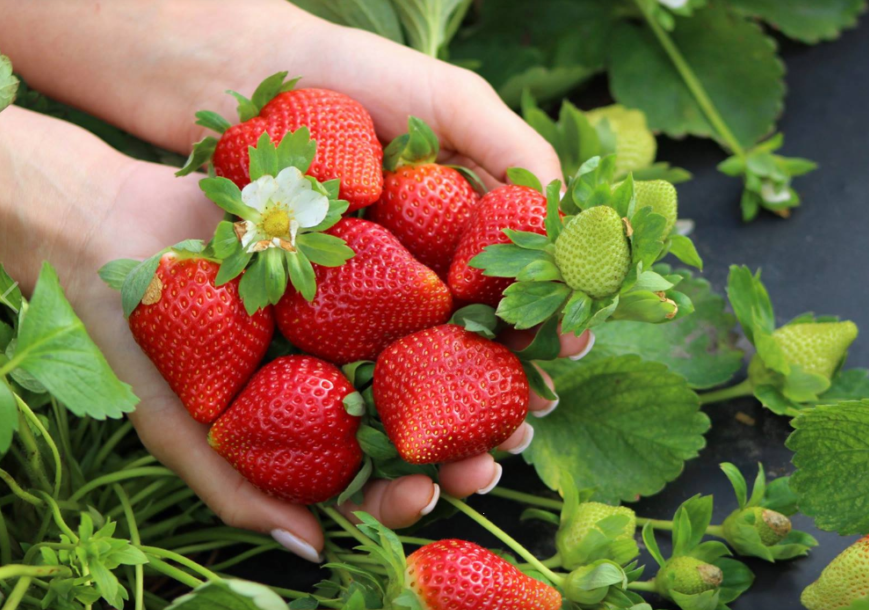In 2005, Wishnatzki Farms became the first grower in Florida to offer organic strawberries on a commercial scale. Five years later the company would rebrand itself as Wish Farms. Now a fourth-generation family business, the Plant City, FL-based, year-round berry supplier is an international grower, shipper and marketer. Organic Produce Network discusses the evolution of its organic business, the challenges of operating in a global pandemic and its outreach to retailers with Amber Maloney, director of marketing.

Amber Maloney, director of marketing, Wish Farms
Can you give us a mini history of why the company invested in organics and the myriad of ups and downs of organics during the past 15 years?
The organic segment is one that has steadily gained market share over the past couple of decades. We saw a market void during the Florida season in the early 2000s. We started growing in a greenhouse, but after a couple of seasons we made an economic decision to move that operation outside. There was heavy industry skepticism, largely due to the enormous disease and pest pressure crops face in Florida. While we struggled early on, we continued to get better and learn every season.
Now, we are one of the largest organic strawberry growers in the state, and the program continues to be a bright spot in our farming operation. Additionally, our investment in our organic blueberry farm — Misty Organics — is another farming differentiator as it utilizes the latest innovative techniques and technology.

Wish Farms organic strawberries
Can you speak about the scope, size and sales volume of the Wish Farms operations?
Wish Farms is a year-round supplier of strawberries, blueberries, blackberries and raspberries offering both conventional and organic varieties. Currently, we market strawberries in Florida and California, blueberries throughout North and South America, and blackberries and raspberries in the United States and Mexico. We have a strategic balance of operating our own farms and partnering with quality growers in key regions. We have seen organic sales grow steadily over the past few years, which now represents around 10-15 percent of our total sales.
Our new headquarters in Plant City features 130,000 square feet of warehouse and features a MACS Cooler for efficient cooling, a 20,000-foot solar array and an organic blueberry farm.
How has the coronavirus complicated sales of organic berries?
Our team has worked around the clock communicating and delivering for our retail partners, while also doing the best job possible for our growers. In the early days of the pandemic, retailers and suppliers were scrambling to figure out a plan as it was difficult to predict demand for berries, especially organics. It was truly a rollercoaster ride.
At first, demand skyrocketed significantly as consumers were panic buying everything in sight. Retailers couldn’t keep berries stocked on the shelf. After a couple of weeks, consumers’ pantries were stocked, and berries, which are typically an in-store impulse buy, were not on grocery delivery lists. Demand fell off a cliff as shoppers were on the hunt for non-perishables and heartier produce. There were also (now debunked) fears that hand-picked produce could transmit the virus.
Wish Farms has delivered berries to the front line workers during the COVID-19 pandemic
As lockdowns eased, people found a new normal. Demand started to return, and it now exceeds historic levels for summer across all organic berries. While there have been ups and downs, organic berry demand is currently very strong. Government stimulus has helped consumers retain their buying power, and the shift from restaurants to eating at home also favors organic purchasing.
How do your organic sales compare to conventional, and how has Wish Farms’ organic operation grown over these 15 years?
Conventional berries are still the largest piece of our overall offering, but our organic program plays a very key role in our business. The retail partners we work with want a full offering of the berry patch which includes organic. We have 200 acres of organic strawberries in Florida, compared to 150 between Salinas and Santa Maria. However, the yields we get out of those 150 acres are nearly double that of our Florida acreage. California has better growing conditions, as the season is longer, and the climate is much drier.
“Our team has worked around the clock communicating and delivering for our retail partners, while also doing the best job possible for our growers. In the early days of the pandemic, retailers and suppliers were scrambling to figure out a plan as it was difficult to predict demand for berries, especially organics.” – Amber Maloney
In Florida, Wish Farms’ organic blueberries are grown in pots and under hoops. How are the berries comparing to other ways of growing organically? What are the biggest differences?
We are utilizing some innovative techniques at our organic blueberry farm, Misty Organics, which sits on a south facing slope that overlooks a lake front. This geographical arrangement, coupled with high tunnels, creates a greenhouse effect. The high tunnels not only provide freeze protection for the crop, they also provide higher growing temperatures during cooler periods. The cover also protects the crop from rain, hail and general moisture.
Misty Organics’ entire crop is grown in containers, which allows for spatial flexibility. As a result, there are more than twice the number of plants per acre than a typical blueberry farm. Additionally, the farm showcases high-tech soil moisture sensors and drip irrigation that drastically reduces water usage. With more than seven blueberry varieties featured, the team can also observe which varieties perform on output and quality.
Wish Farms organic berry fields
Are organic produce items purchased in the same way as conventional, i.e. impulse buys, etc.? How much of a difference does promotional pricing make on organic berry sales?
Retailers display organics differently. Some of them have separate sections for conventional and organic. But what we have seen over the years, many retailers have started to put them both on display, side-by-side. This has helped lead consumers, who would normally purchase conventional, to see organic and possibly make an impulse buy to try organics. Organic shoppers are typically pretty passionate. They are not as price driven because they plan to buy organic despite the higher price. However, to draw new buyers into purchasing organics, pricing strategy and promotions help drive sales and can potentially lead to loyal organic shoppers.
You introduced new organic labels not too long ago. Can you talk a little bit about that initiative?
Our company recently refreshed all of our brand labels, both conventional and organic. The logo now features our new tagline “Generations of Sweetness,” as well as our “Feel Good. Eat Berries. Make A Difference.,” emblem. We wanted our organic labels to really stand out with bright bold shades of green.
How does Wish Farms work with retailers on sales of its organic berries?
Wish Farms is very retail focused. Not only do we invest a great deal into marketing and brand awareness across multiple channels, we are also dedicated to developing custom strategies that align with our retail partners. Our team works with grocers on ways to best merchandise our berries to maximize organic sales. Examples include pricing strategy and promotions, social media content, paid advertisement and influencer collaboration.
We provide retailers in-store signage showcasing our rich history, growing standards, and passion for farming. Consumers, specifically organic purchasers, appreciate knowing where their produce comes from. They want to understand growing and harvesting practices, farm sustainability, innovation efforts and the like. Through our unit-level traceability program, we are able to connect consumers direct to our farmers.















